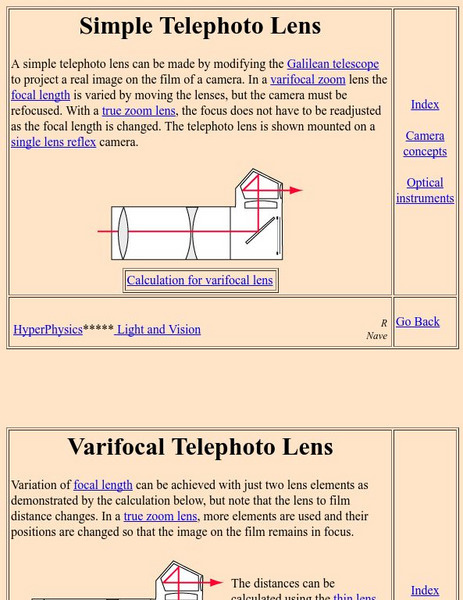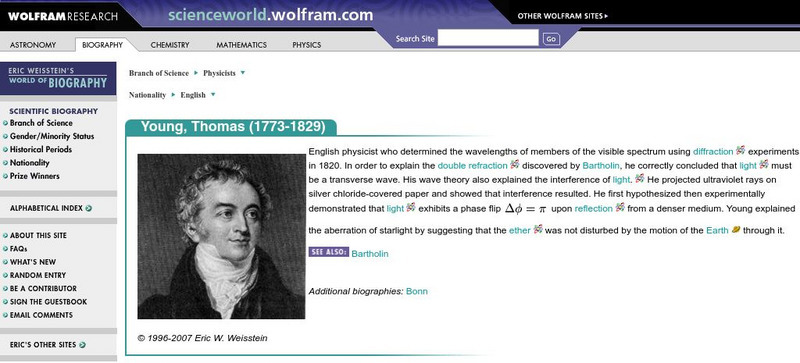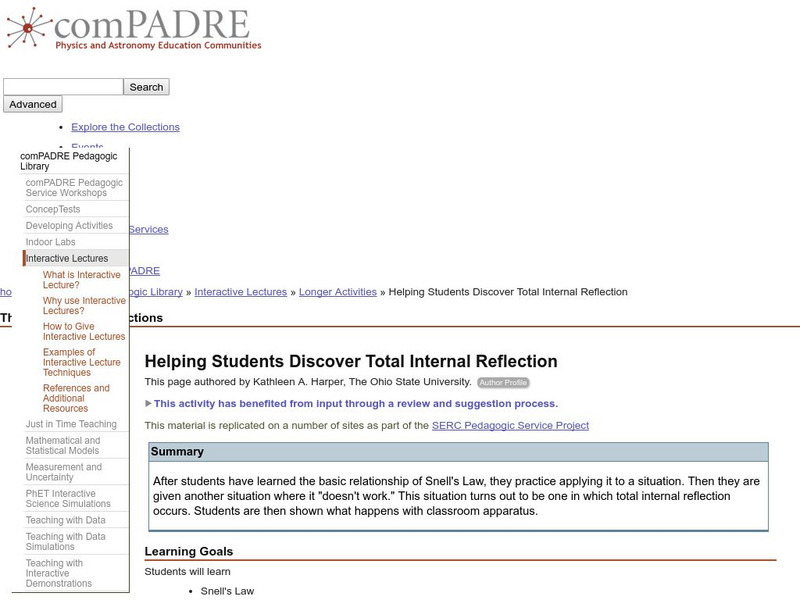TeachEngineering
Teach Engineering: Energy
Through nine lessons, students are introduced to a range of energy types--electrical, light, sound and thermal-as well as the renewable energy sources of wind, hydro (water) and solar power. Subjects range from understanding that the...
TeachEngineering
Teach Engineering: Tell Me Doc, Will I Get Cancer?
Students are introduced to the challenge called, Tell Me the Odds, discovering a new way to assess a person's risk of breast cancer. Solving this challenge requires knowledge of refraction and the properties of light.
Curated OER
Ntnu Virtual Physics Lab: Find the Fastest Path
Chinese-language Java applet illustrating Fermat's principle that light follows the fastest path between any two points. Excellent animation and accompanying text. Relates Fermat's principle to Snell's law.
PBS
Pbs Learning Media: Galileo's Telescope
The invention of the telescope helped change our understanding of the universe. This video segment adapted from NOVA looks at Galileo's contribution to this technology. [1:49]
Georgia State University
Georgia State University: Hyper Physics: Thin Lens Equation
This is an informative site from Georgia State University. It gives a discussion of the thin lens equation and an illustration of its use in determining the image distance based upon the object distance and the focal length.
University of St. Andrews (UK)
University of St. Andrews: Andre Marie Ampere
Resource provides a biography of the scientist Andre Marie Ampere.
Georgia State University
Georgia State University: Hyper Physics: Telephoto Lens
At this site from Georgia State University Physics Department the operation of a telephoto lens is discussed. The refraction of light through the lens is shown and a link to a calculation page is provided.
Science Education Resource Center at Carleton College
Serc: Asbestos Hazard Assessment
This interactive site introduces students to concepts related to asbestos and how geologists analyze asbestos in building materials. The site is divided into three components: the geology of asbestos, identifying asbestos in the lab, and...
Wolfram Research
Wolfram Science World: Young, Thomas
This site from ScienceWorld provides a very short but factual biographical sketch of Thomas Young (1773-1829 CE) and describes his most notable scientific discoveries and contributions. Links are also provided throughout for additional...
Walter Fendt
Walter Fendt: Apps Zur Physik
This site, in German, offers numerous apps that illustrate common physics principles. Apps are organized into categories: mechanics, oscillations and waves, electrodynamics, optics, thermodynamics, the theory of relativity, physics of...
Science Education Resource Center at Carleton College
Serc: Helping Students Discover Total Internal Reflection
After students have learned the basic relationship of Snell's Law, they practice applying it to a situation. Then they are given another situation where it doesn't work, which turns out to be one in which total internal reflection occurs.
Other
Weather Photography
Source of information on the subject of weather photography. There are great links, images and tips on equipment to use. For the intermediate to advanced photographer.
Physics Classroom
The Physics Classroom: Ray Diagrams for Concave Mirrors Case B
Ray diagrams are useful tools for determining the location of an image as produced by a concave mirror. Of all the rays which emanate from the top of the object arrow and are incident to the mirror, there are two rays whose behavior at...
Physics Classroom
The Physics Classroom: Ray Diagrams for Concave Mirrors Case D
Ray diagrams are useful tools for determining the location of an image as produced by a concave mirror. Of all the rays which emanate from the top of the object arrow and are incident to the mirror, there are two rays whose behavior at...
Curated OER
Georgia State University: Telephoto Lens
At this site from Georgia State University Physics Department the operation of a telephoto lens is discussed. The refraction of light through the lens is shown and a link to a calculation page is provided.
Curated OER
Georgia State University: Telephoto Lens
At this site from Georgia State University Physics Department the operation of a telephoto lens is discussed. The refraction of light through the lens is shown and a link to a calculation page is provided.
Curated OER
Ntnu Virtual Physics Lab: Thin Lens Combination
A Java applet which allows the user to emulate a refracting telescope and a light microscope. This is a great site to get information on the subject and better understand it through diagrams and charts.
Curated OER
Ntnu Virtual Physics Lab: Thin Lens Combination
A Java applet which allows the user to emulate a refracting telescope and a light microscope. This is a great site to get information on the subject and better understand it through diagrams and charts.
Curated OER
Ntnu Virtual Physics Lab: Thick Lens Java Applet
An interactive Java applet which allows the user to investigate the path of light through a lens shape object. The shape of the object, the index of refraction of the material, and the location of the incident rays can be altered.
Other popular searches
- Refraction of Light
- Science Light Refraction
- Light Refraction Water
- Lab on Light Refraction
- Reflection Refraction Light
- Prism Light Refraction
- Light Refraction by Prism
- Refraction of Light Mirrors
- Light Refraction Slide
- Science Refraction of Light
- "Refraction" Light
- Science: Refraction of Light









